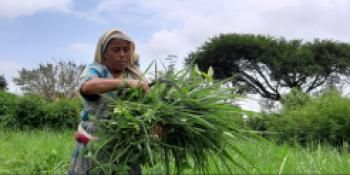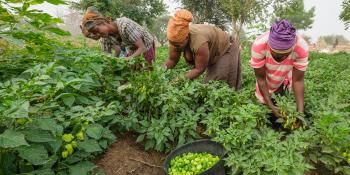More than numbers: Why counting heads in the climate talks won’t do women farmers any favors

Counting the number of women participating in the climate conference will not be enough to really transform the lives of billions of smallholder farmers - both men and women
Guest blog by Agnes Otzelberger, CARE International
If it took three hours for the issue of gender inequality to be raised at the end of the Agriculture Workshop at this year’s UN Climate talks in Warsaw (”COP19”), the Global Landscapes Forum held in parallel to the talks put gender on the table right from the opening speeches.
The crucial role of equal rights and opportunities for men and women in a resilient and sustainable future for agriculture was brought up by various high-level speakers such as Rachel Kyte from the World Bank, while later being discussed during an informal ”Gender Café" and during the Forum Session ”linking gendered knowledge with gender-responsive action in the landscape”.
Dr. Bruce Campbell, Director of the CGIAR Research Program on Climate Change, Agriculture and Food Security (CCAFS), opened the Forum's Gender Café discussions by mentioning the persistent gender inequalities in agriculture, where women and men are still faced with different opportunities and prospects. According to him,
climate change and agriculture project activities need to be gender-sensitive, with the main goal being equal access to information, resources, credits, and decision-making forums, for both men and women farmers.
And even in the football stadium across the river Vistula, where COP19 is still taking place, it is clear that gender equality has become much more visible and afforded greater importance than it was not so long ago.
At COP19, for the first time, gender is being discussed as a formal part of the agenda. This is a major achievement after long-standing existence of gender as a “side event” (both literally and metaphorically) on the fringes of the climate negotiations – a success that can be attributed in large part to the concerted action of civil society, UN agencies, intergovernmental organisations and champions amongst governments, working together under the umbrella of the Global Gender and Climate Alliance.
So, as organisations putting gender equality at the heart of our work on climate change, food and agriculture, can we sit back and relax? Definitely not. We need to stay firmly on the ball!
Having established that gender equity is not optional, what’s needed next is a common understanding of what this means for policy and action on climate change, and for the research that informs both. And what needs to be understood here, first and foremost, is that gender equity in climate policy, action, and research is about more than numbers.

Will an additional woman in a high level forum automatically improve the life of a rural woman farmer? Photo: UNAMID
Why are we saying this? Because firstly, it took a long time to persuade negotiators, back at COP18 in Doha last year, that gender balance – a term used to describe the equal representation of women and men – is not enough.
There are still many people inside and outside the negotiations who still don’t understand the issue. Gender balance is indeed a cornerstone of fairness in any decision-making process that claims to be representative.
However, increasing the numbers of women on your delegation, on your panel, or amongst your membership, does not automatically change anything for the billions of people worldwide who live in poverty and whose life chances, choices and options in a changing climate, amongst other things, still too often depend on whether they were born male or female. For them, what really matters is equity, or fairness, in how responsibilities and resources for climate-resilient agriculture are distributed.
Secondly, as raised at the Landscapes Forum by Dr. Seema Arora-Jonsson, greater caution needs to be applied in the way numbers are often used to make the case for gender equity in agriculture and climate change. The connection between atmospheric changes, soils and plants, poverty and complex social realities is not immediately visible to all, so the argument for gender equity in addressing climate change has been, as Arora-Jonsson points out, “under pressure to sloganise and simplify” the complex situations we face in different parts of the world.
Seema Arora-Jonsson also mentioned that quite a few of the statements typically found in the preambles of documents or speeches on gender and climate are anecdotal, and cannot be traced back to statistically rigorous data. And statistics – rigorous or not – on the roles of women in the household economy, agricultural production or natural resource management are often presented in ways that are more likely to put additional burdens on them rather than leading to equal rights and opportunities. These numbers often reinforce generalised assumptions about women’s (and men’s) roles.
Challenging these assumptions at the same time as we are highlighting persistent gender inequalities in, for example, land tenure, education and income, was a key issue at a recent gender training of the CGIAR Research Program on Climate Change, Agriculture and Food Security (CCAFS) which CARE was involved in, and is an important task for research in the years ahead.
It is encouraging that gender equality has at last been assigned a firmer place in global climate policy, which could lead to a more equitable Green Climate Fund, but the challenge does not end here. Given that negotiators might have given up on agriculture at COP19, there is all the more work to do to ensure that people living in poverty don’t shoulder even more burdens in a warming world.
Learn more about the CCAFS Gender Training workshop: Challenging gender assumptions within farming and climate change research
Agnes Otzelberger talks about the need to challenge gender assumptions in climate change and agriculture research:
What is CCAFS doing on gender in the context of agriculture and climate change? Find out on our Gender Page.
Agnes Otzelberger is the Climate Change Adaptation and Gender Coordinator in the CARE International Poverty, Environment and Climate Change Network. CCAFS is working closely with CARE on issues related to gender equity and gender integration in agriculture and climate change. This guest blog might not necessarily reflect the views of CCAFS.



